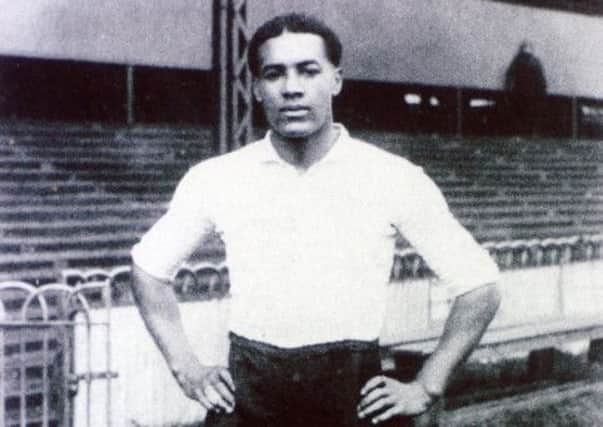Celebrating the life of a brave soldier and footballer


AFTER almost a century of virtual anonymity people are beginning to recognise the name Walter Tull - the first black officer in the British Army.
Last month it was announced that a special set of coins is to be released by the Royal Mint in his honour. This followed a vociferous campaign last year to posthumously award Walter, a former professional footballer, a Military Cross for his heroism backed by the likes of Garth Crooks and Sol Campbell.
Advertisement
Hide AdAdvertisement
Hide AdA new film celebrating his life, starring former Leeds United and Sheffield United player Vinnie Jones and Yorkshire-born actor Tom Wilkinson, is in the pipeline. But before then a new play is touring the UK as part of Black History Month and tomorrow is being performed at the Carriageworks Theatre, in Leeds.
The Hallowed Turf, the latest production by Gazebo Theatre, tells the story of Walter Tull through the eyes of a young unknown soldier who meets his hero on the front line.
The play includes a backdrop of original film footage courtesy of the Imperial War Museum and draws on Walter’s experiences to create an enduring story of bravery and friendship in the midst of the horrors of trench warfare.
His real life story is a remarkable one. The grandson of a slave, he made history in the army as well as on the pitch.
Advertisement
Hide AdAdvertisement
Hide AdWalter was born in Folkestone in 1888. His father was a carpenter from Barbados who had moved to Kent and married a local woman.
His footballing career began with Tottenham Hotspur in 1909, when he became the first black professional outfield footballer in Britain. However, he suffered racial abuse and moved on to Northampton the following year.
He enlisted in ithe army in 1914. He survived Passchendale and the first Battle of the Somme to become , rising to become a 2nd Lieutenant in 1917 – which was an almost unimaginable achievement at that time.
Walter was later singled out for “gallantry and coolness” when leading a risky expedition over a frozen river on the Italian front, but was killed during the Second Battle of the Somme in March 1918, at the age of 29.
Advertisement
Hide AdAdvertisement
Hide AdHe was recommended for a Military Cross but never received one.
Some of his relatives have been to see the new play and Pat Justad, his great niece, is pleased his story is finally being told to a new audience.
“As a family we have been glad that Walter has been such an inspiration, and his life story has been used to highlight many important issues. ’Uncle Walter’ was always a hero within the family, and as children we took any opportunity to boast about his football career and the fact that he was the first black officer in the British Army.”
Pamela Cole-Hudson, the play’s writer and director, was intrigued by him, too.
Advertisement
Hide AdAdvertisement
Hide Ad“He was so well loved by his men. When he was killed members of his battalion tried to retrieve his body but couldn’t reach him. That really interested me, his relationship with his men, and what it was about his character that inspired them.”
She, too, believes Tull’s story needs to be heard. “It think it’s important, particularly in this centenary year, to recognise the role played by Africans and African-Carribeans in the war,” she says.
“Walter Tull was born in Folkestone, he was British. There were many others like him but people have forgotten about them.”
Which is why it’s important that Tull, and all those from ethnic backgrounds who served their country during the Great War, are remembered.
The Hallowed Turf, at the Carriageworks, Leeds, tomorrow at 7.30pm. For tickets call the box office on 0113 224 3801 or go online at www.leeds.gov.uk/carriage